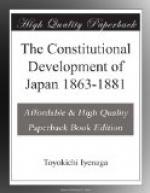“1. Let them restore the territories which they have received from the Emperor and return to a constitutional and undivided nation.
“2. Let them abandon their titles, and under the name of Kuazoku (persons of honor) receive such small properties as may suffice for their wants.
“3. Let the officers of the clans abandoning that title call themselves officers of the Emperor, receiving property equal to that which they have hitherto held.
“Let these three important measures be adopted forthwith, that the empire may be raised on a basis imperishable for ages ... 2nd year of Meiji (1869).
(Signed) “Akidzuki Ukio no Suke."[1]
But politics is not an easy game—a game which a pedant or a sentimental scholar or an orator can leisurely play. It has to deal with passions, ambitions, and selfish interests of men, as well as with the moral and intellectual consciousness of the people. Tongue and pen wield, undoubtedly, a great influence in shaping the thought of the nation and impressing them with the importance of any political measure. But the tongue is as sounding brass and the pen as useless steel unless they are backed by force and money. Even in such a country as England, where tongue and pen seem to reign supreme, a prime minister before he forms his cabinet has to be closeted for hours with Mr. Rothschild. Fortunately this important measure of abolishing feudalism, which a few patriots had secretly plotted and which the scholars had noised abroad, was taken up first by the most powerful and wealthy Daimios of the country.
In the following noted memorial, after reviewing the political history of Japan during the past few hundred years, these Daimios said: “Now the great Government has been newly restored and the Emperor himself undertakes the direction of affairs. This is, indeed, a rare and mighty event. We have the name (of an Imperial Government), we must also have the fact. Our first duty is to illustrate our faithfulness and to prove our loyalty. When the line of Tokugawa arose it divided the country amongst its kinsfolk, and there were many who founded the fortunes of their families upon it. They waited not to ask whether the lands and men that they received were the gift of the Emperor; for ages they continued to inherit these lands until this day. Others said that their possessions were the prize of their spears and bows, as if they had entered storehouses and stolen the treasure therein, boasting to the soldiers by whom they were surrounded that they had done this regardless of their lives. Those who enter storehouses are known by all men to be thieves, but those who rob lands and steal men are not looked upon with suspicion. How are loyalty and faith confused and destroyed!




